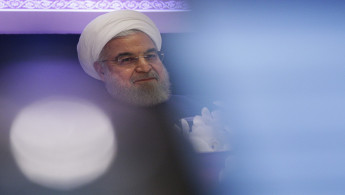Iranians must have 'right to choose' at polls, Rouhani says following disqualification of candidates
Speaking at the mausoleum of Ayatollah Ruhollah Khomeini during annual celebrations of the 1979 revolution, Rouhani, a moderate conservative, praised the political heritage of the Islamic republic's founder.
"The imam (Khomeini) insisted on the fact that people must participate in all elections and have the right to choose", Rouhani said during the address, broadcast on state television.
"Whoever prevents people from choosing, and does not allow them to choose between different (political) tendencies, and whoever discourages people from going to the polls, is certainly far from the approach of the imam", he added, surrounded by members of the government.
Controversy has been raging for the last fortnight, pitting the coalition that supports Rouhani's government against the Guardian Council, which oversees Iran's elections and is dominated by ultra-conservatives.
The council says it has barred some 9,500 potential candidates from standing in the February 21 legislative polls - almost two thirds of the 14,500 hopefuls - including 92 sitting MPs from of all political stripes.
Those who are barred are allowed to appeal before the election.
Read more: Hardline forces in Iran are poised to gain strength
Paying homage the "father of republicanism in Iran", Rouhani said Khomeini had "refused" to establish a "caliphate" and instead "chose the Islamic republic" after the victory of the revolution against the shah's rule.
The US-backed government of the shah fell on February 11, 1979, 10 days after Khomeini's triumphant return from exile.
Rouhani made reference to the failed constitutional revolution in 1905 - the first attempt to establish democracy in Iran - with the restoration of an absolute monarchy some years later.
He warned that the same could happen to the Islamic republic if elections became a mere "formality", with weak turnout.
Twitter Post
|
Since mid-January, the president has repeatedly sought to mobilise the electorate, with a number of analysts predicting his alliance of moderates and reformers will take a beating.
Last week, Rouhani warned of threats to the Islamic republic's "democracy and national sovereignty" after the disqualification of the candidates.
Rouhani also stressed the importance of the election: "This parliamentary election is a very important election… I have written letters to relevant authorities to resolve the issue of disqualifications," Rouhani warned.
"You [hardliners] claim that you will win the election. That is fine, but just let the election be a competitive one. I am calling on our nation to vote. Even if you have criticism over issues and problems, please cast your vote."
Read more: Iran's factories produce thousands of US, Israeli and British flags for protesters to burn
Iran is set to have elections on 21 February as Iran's clerical rulers face challenges in keeping the economy afloat under increasing tough US sanctions imposed by Washington after it withdraw in 2018 from Tehran's nuclear deal. Oil exports have been slashed, too.
President Donald Trump in 2018 pulled out of the accord negotiated by his predecessor Barack Obama, sending tensions soaring with Iran and leading Tehran to curb compliance, but European powers still back the deal.
The United States on Thursday extended exemptions to let an internationally backed nuclear deal with Iran go forward, even as it announced new sanctions to step up pressure.
The Trump administration has repeatedly extended the waivers but stopped doing so in November for another site, Fordo, in retaliation for Iran's lifting its level of uranium enrichment.
Trump, a close ally of Iran's rivals Saudi Arabia and Israel, has vowed to fight Iran's regional role and earlier this month ordered the killing of Iran's most powerful general.
Follow us on Twitter and Instagram to stay connected





 Follow the Middle East's top stories in English at The New Arab on Google News
Follow the Middle East's top stories in English at The New Arab on Google News
![The UAE is widely suspected of arming the RSF militia [Getty]](/sites/default/files/styles/image_330x185/public/2024-11/GettyImages-472529908.jpg?h=69f2b9d0&itok=Yauw3YTG)
![Netanyahu furiously denounced the ICC [Getty]](/sites/default/files/styles/image_330x185/public/2024-11/GettyImages-2169352575.jpg?h=199d8c1f&itok=-vRiruf5)
![Both Hamas and the Palestinian Authority welcomed the ICC arrest warrants [Getty]](/sites/default/files/styles/image_330x185/public/2024-11/GettyImages-2178351173.jpg?h=199d8c1f&itok=TV858iVg)